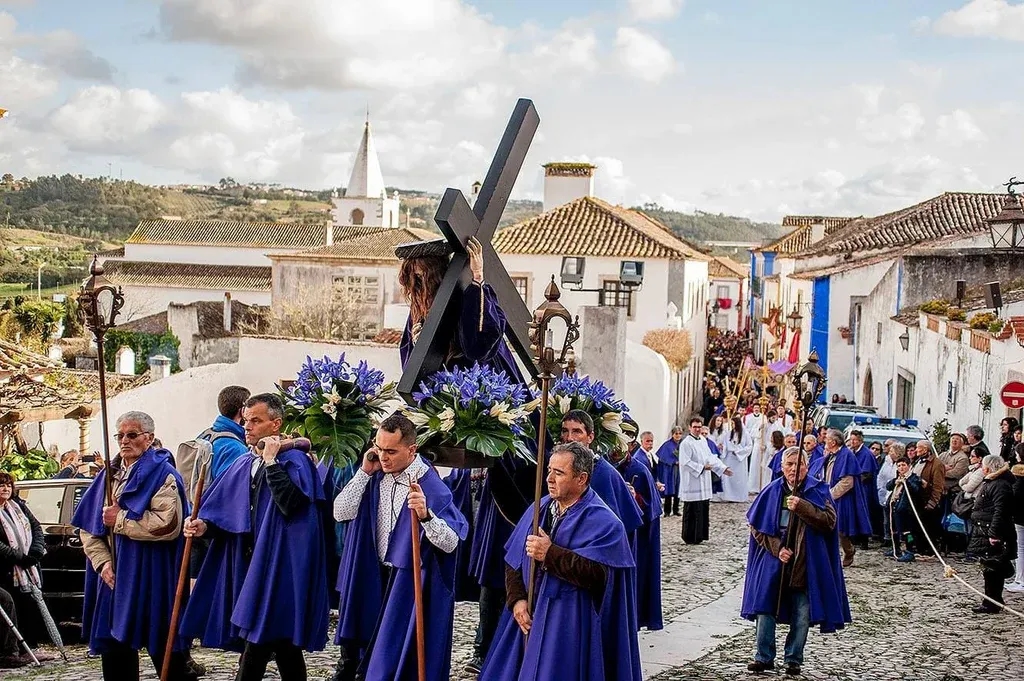
In Portugal, faith does not hide. It is sung, sometimes danced, adorned with flowers and light. It even flows down into the streets, to the sound of bells and drums, carried by entire generations. Whether you are a believer, a simple onlooker or a lover of shared emotions, attending a religious procession in Portugal means diving into one of the most profound and authentic aspects of Portuguese culture! Between fervour, tradition and popular spectacle, these parades reveal the soul of a country where spirituality often rhymes with conviviality.
A tradition centuries old
Processions have been an integral part of Portuguese life since the Middle Ages. At first purely religious, they served to implore divine protection against epidemics, famines or storms. Today, they have retained their spiritual essence, but have become moments of community gathering and also of local pride. Each region, each village has “its” procession, often linked to a patron saint (the Saint of the Town, for example) or to a significant event in local history.
In some towns, the streets are covered with flower petals, balconies are decorated with embroidered fabrics, residents wear their finest clothes, and everyone, believer or not, gathers around the same procession. It’s this blend of piety and celebration that makes these moments unique !

Between faith and performance
Watching a procession is a bit like watching a life-size film. The statues of the saints, richly adorned, are carried on andores (those mobile altars), often decorated with flowers, ribbons and candles. Men (and sometimes women) carry them on their shoulders, moving slowly to the rhythm of brass bands and religious chants.
The contrast is striking : on one side, the solemn silence of the crowd ; on the other, the music, the children’s cries, the whispered prayers and the flashes of mobile phones (yes, that’s a more recent touch). A mixture of sacred and profane that gives these events an almost theatrical atmosphere. And that’s the charm of Portugal : a joyful, sincere spirituality, where faith is not lived in restraint but in sharing (always!).
Braga, the capital of Holy Week
If there is one city where religious fervour reaches its peak, it’s Braga, in the north of the country. And it’s not for nothing that it’s nicknamed “the Portuguese Rome” : Holy Week here is celebrated with exceptional intensity.
For several days, the entire city transforms… The narrow streets of the historic centre are lit by candlelight, church altars are draped in purple and gold, and processions follow one after another, day and night. Among them, the “Ecce Homo” procession is the most famous: penitents dressed in long black tunics, faces hidden under hoods, walk barefoot in solemn silence (yes, the spectacle is both haunting and hypnotic, I can confirm !). Even without sharing the Catholic faith, it’s hard not to be moved by the symbolic power of this moment. Braga, during these days, breathes devotion, but also living heritage, passed down from generation to generation.
Óbidos and the floral carpets of Corpus Christi
A different setting, a different atmosphere. In Óbidos, that magnificent little medieval town full of charm, the feast of Corpus Christi transforms its cobbled streets into true floral carpets. The residents prepare for days in advance, creating designs out of flowers, coloured sawdust and leaves, which they spread on the ground before the procession passes.
When the priest, the faithful and the altar boys walk over these ephemeral carpets, it’s a symbol in itself: the fragile beauty of faith and collective effort. The bells ring, the petals fly, and the scent of jasmine and wax mingles in the warm air. It’s a spectacle of rare poetry, somewhere between religious ritual and folk art. You leave with a lighter heart, as if you had witnessed something deeply human.
Marian feasts and promises of faith
In Portugal, many processions are also linked to promises (promessas). Some devotees walk barefoot, others carry giant candles, sometimes even wooden crosses, in gratitude for a grace received or to implore divine help. The most famous of these celebrations are those dedicated to the Virgin Mary. In Fátima, thousands of pilgrims gather each year (often on foot, walking for days and days from all over the country !). But there are also smaller Marian processions, in villages, where the fervour is no less intense than in the great sanctuaries.
This blend of sincere faith, occasional pain, and shared joy gives these moments a rare intensity. Even those who do not pray are carried along by the collective energy, by this feeling of belonging, unity and hope.
The fishermen’s processions, between sea and blessing
On the coast, the sea is never far away, not even in religion! In towns such as Nazaré, Peniche or Setúbal, the processions in honour of Our Lady of the Fishermen are among the most beautiful in the country (truly worth seeing !).
The boats, decorated with garlands and flags, accompany the statue of the Virgin out to sea, in a floating procession. The sirens sound, seagulls circle above, and families watch from the shore, waving their handkerchiefs.
It’s a moment of gratitude to the ocean, but also of remembrance. Each year, people think of those who did not return, of those who live from the sea and for the sea. The emotion is palpable, often more than in any other religious ceremony.
When faith becomes heritage
What’s striking about these processions is how they mix the sacred and the social. Far more than religious rites, they have become cultural landmarks, expressions of local identity. Residents prepare for weeks: they sew, decorate, rehearse songs, and prepare shared meals. Children proudly parade in choir robes, elders rediscover the gestures of the past, families come together. It’s an entire community telling its story through a single movement, a single path.
UNESCO has even recognised some of these traditions as intangible heritage, highlighting their role in transmitting values, skills and collective memory, just to give you an idea !
A joyful and convivial faith
Because in Portugal, faith isn’t austere, quite the opposite ! It always comes with a glass of wine (Port wine, of course), a shared meal and music. After the procession, people often gather in the main square, around a meal or a village dance. The brass bands turn into orchestras, candles give way to paper lanterns, and prayers become songs.
It’s this blend of fervour and festivity that makes Portuguese processions so unique. You can come to believe, to observe or simply to feel. The important thing is to take part, to be there, to share a suspended moment, somewhere between heaven and earth.
For the curious in search of emotion
If you visit Portugal in spring or summer, chances are a procession will cross your path. Don’t walk past it… Stop, look, listen. Let yourself be enveloped by the slow rhythm, the scent of incense, the murmurs and the smiles. Even without understanding everything, you can feel that invisible bond between people and their history. It’s not only religion being expressed, but a culture, a way of life, a collective heritage passed on in the street, under the sun. Portuguese processions are not static performances, but living celebrations. They embody that duality so characteristic of the country : between fervour and folklore, between silence and music, between tears and laughter. They remind us that faith here is lived as much as it is prayed.
And if you’ve never seen one, add it to your list ! Because, around a flowered alleyway, to the sound of a brass band or the crackle of candles, you’ll understand that these processions are not just religious traditions. They are moments of shared beauty, where Portugal reveals itself as it truly is: sincere, vibrant, profoundly human.
Share this article
Suggested articles
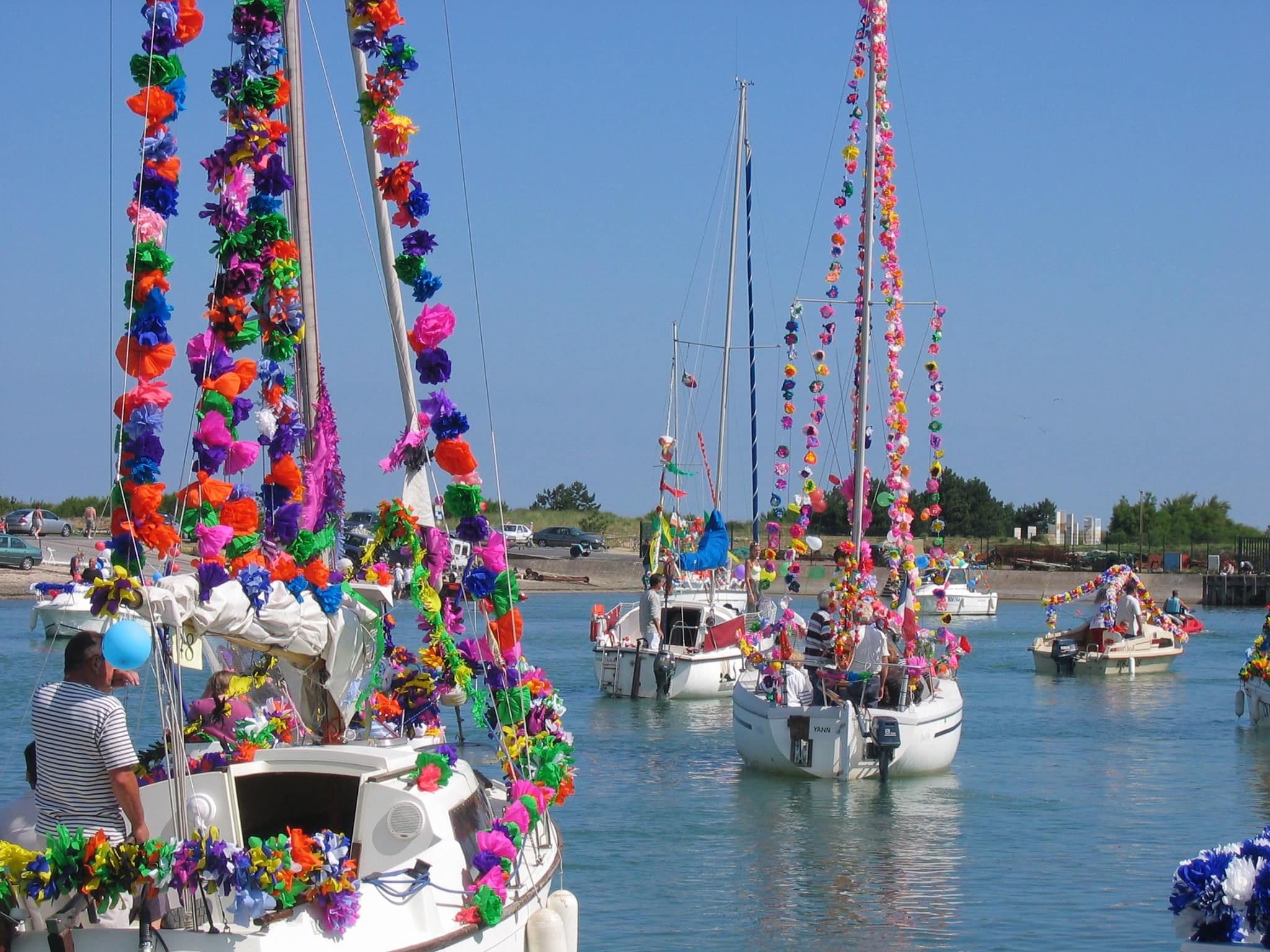
Sea Festivals in the Algarve
In the Algarve, the sea is more than a blue horizon — it’s a way of life, an identity, a shared memory. From fishing villages to seaside resorts, Portugal’s southern coast comes alive every summer with maritime celebrations. These festivals pay tribute to the ocean, the fishermen, and the sense of community that defines the region. Colorful lights shimmer on the waves, boats are dressed in flags, and the scent of grilled fish drifts through the warm evening air.
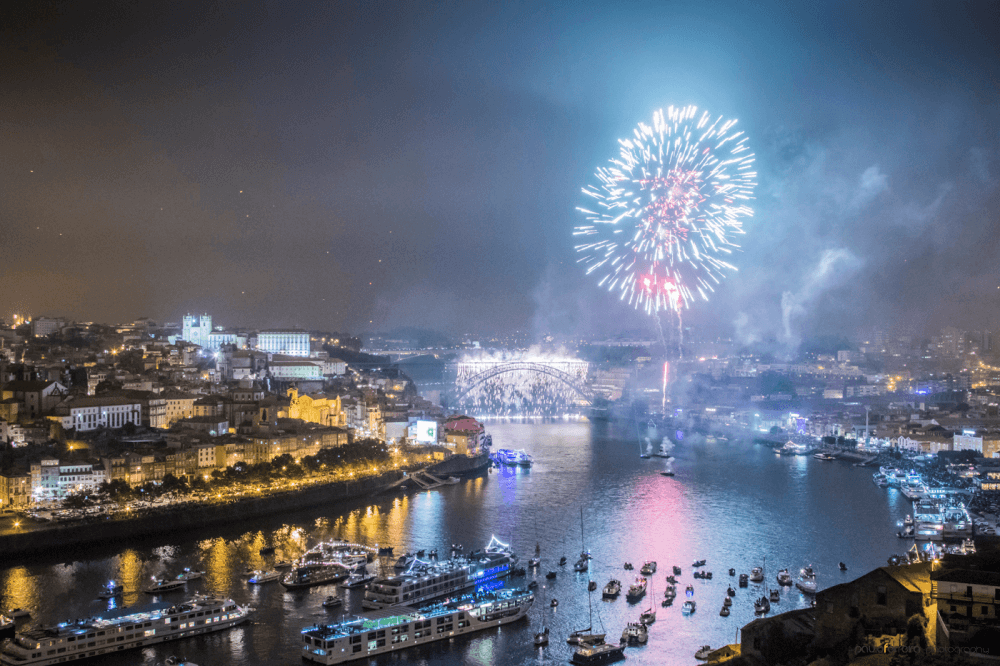
The Feast of São João in Porto, between lanterns, sardines, and plastic hammers
Porto, on the evening of June 24… The air smells of grilled sardines, colorful garlands dance in the wind, and a strange noise echoes through the narrow streets: clack, clack, clack. No, it’s not a nighttime construction site, but thousands of plastic hammers joyfully tapping consenting heads. Welcome to the Feast of São João, one of the most anticipated events of the year in Portugal and without a doubt, the happiest chaos you’ll ever experience !
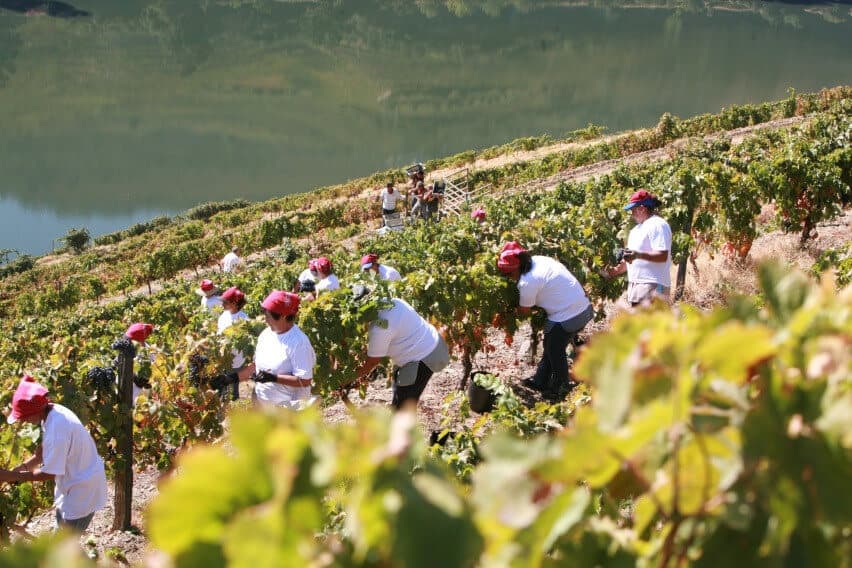
The Harvest in the Douro Valley
Between sweat, laughter and Port wine… Portugal in all its splendour! The sun beats down on the golden slopes of the Douro. The vineyards stretch as far as the eye can see, perfectly aligned on terraced hills that seem to defy gravity. The air smells of ripe grapes, warm earth and… a little sweat too (let’s not kid ourselves, harvesting here is no leisure sport!). In this valley, listed as a UNESCO World Heritage site, every autumn follows the same ritual: hundreds of hands at work, scissors clicking, laughter echoing, and the wine… that famous Douro wine… begins its new life !
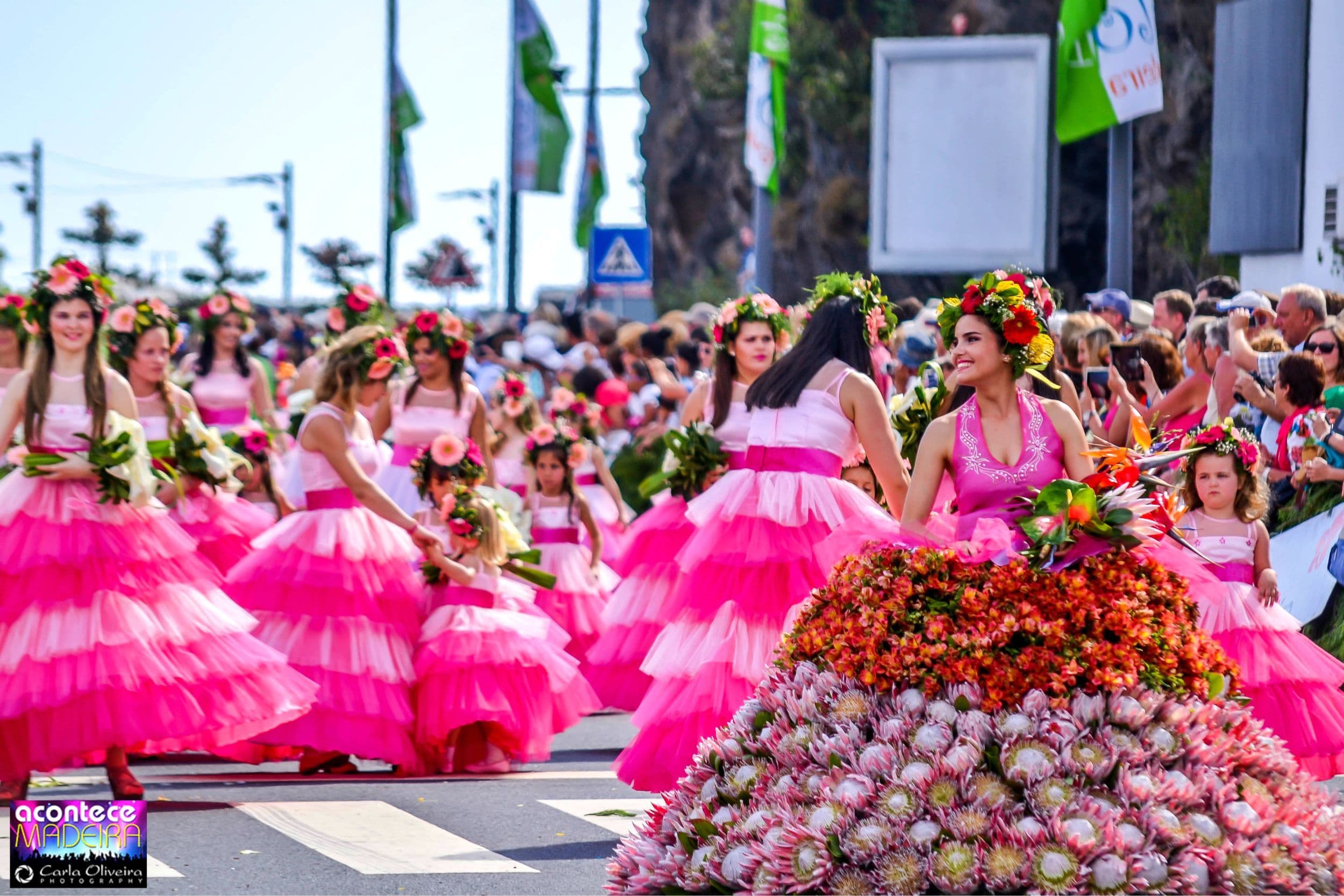
Festa da Flor in Madeira: explosion of colors and traditions
There are moments when Madeira feels like a dream. The air is soft, the breeze carries the scent of jasmine and orchids, and the mountains glow in every shade of green. But it’s in spring, during the Festa da Flor, that the island truly reveals its soul.
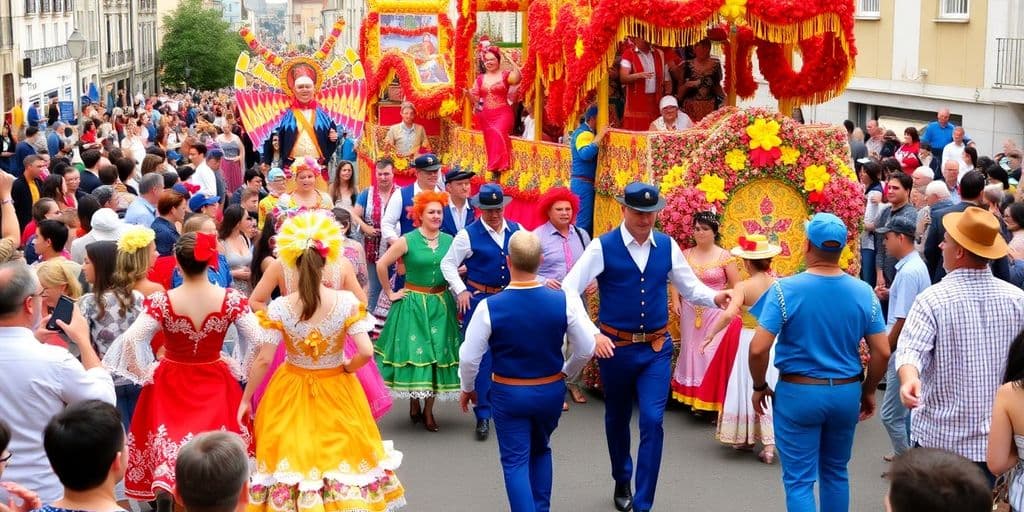
The Portuguese Carnivals, from Torres Vedras to Ovar
February in Portugal isn’t just the month of gentle rain and steaming coffee. It’s above all the time when the whole country dresses up, puts on makeup, dances, sings and laughs until losing its voice… Because here, Carnival isn’t just a parade! It’s an institution, a collective outburst of joy, a cheerful, well-organised chaos.


